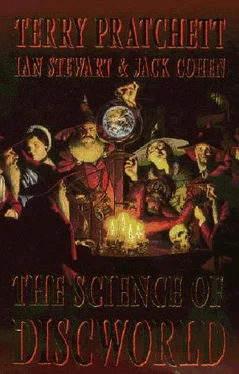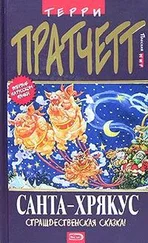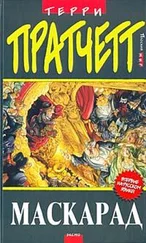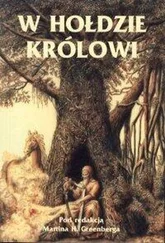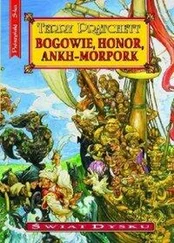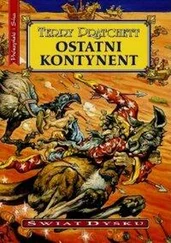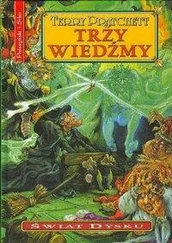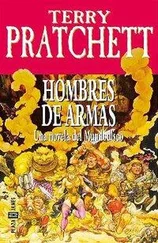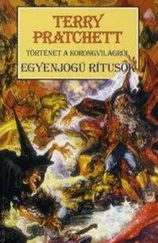Terry Pratchett - Science of Discworld
Здесь есть возможность читать онлайн «Terry Pratchett - Science of Discworld» весь текст электронной книги совершенно бесплатно (целиком полную версию без сокращений). В некоторых случаях можно слушать аудио, скачать через торрент в формате fb2 и присутствует краткое содержание. Жанр: Фантастика и фэнтези, на английском языке. Описание произведения, (предисловие) а так же отзывы посетителей доступны на портале библиотеки ЛибКат.
- Название:Science of Discworld
- Автор:
- Жанр:
- Год:неизвестен
- ISBN:нет данных
- Рейтинг книги:4 / 5. Голосов: 1
-
Избранное:Добавить в избранное
- Отзывы:
-
Ваша оценка:
- 80
- 1
- 2
- 3
- 4
- 5
Science of Discworld: краткое содержание, описание и аннотация
Предлагаем к чтению аннотацию, описание, краткое содержание или предисловие (зависит от того, что написал сам автор книги «Science of Discworld»). Если вы не нашли необходимую информацию о книге — напишите в комментариях, мы постараемся отыскать её.
Science of Discworld — читать онлайн бесплатно полную книгу (весь текст) целиком
Ниже представлен текст книги, разбитый по страницам. Система сохранения места последней прочитанной страницы, позволяет с удобством читать онлайн бесплатно книгу «Science of Discworld», без необходимости каждый раз заново искать на чём Вы остановились. Поставьте закладку, и сможете в любой момент перейти на страницу, на которой закончили чтение.
Интервал:
Закладка:
Turtles all the way down?
Does physics go all the way down, or does it stop at some level? If it stops, is that the Ultimate Secret, or just a point beyond which the physicists' way of thinking fails?
The conceptual problem here is difficult because the universe is a becoming, a process, and we want to think of it as a thing. We don't only find it puzzling that the universe was so different back then, that particles behaved differently, that the universe then became the universe now, and will perhaps eventually cease expanding and collapse back to a point in a Big Crunch. We are familiar with babies becoming children becoming adults, but these processes always surprise us, we like things to keep the same character, so 'becoming' is difficult for our minds to handle.
There is another element of the first moments of our universe that is even more difficult to think about. Where did the Laws come from? Why are there such things as protons and electrons, quarks and gluons? We usually separate processes into two conceptually distinct causal chunks: the initial conditions, and the rules by which they are transformed as time passes. For the solar system, for instance, the initial conditions are the positions and speeds of the planets at some chosen instant of time; the rules are the laws of gravitation and motion, which tell us how those positions and speeds will change thereafter. But for the beginning of the universe, the initial conditions seem not to be there at all. Even there isn't there! So it seems that it's all done by rules. Where did the rules come from? Did they have to be invented? Or were they just sitting in some unimaginable timeless pseudo-existence, waiting to be called up? Or did they uncurl in the early moments of the universe, as Something appeared, so that the universe invented its own rules along with space and time?
During the becoming of its first moments, our universe kept changing its state, changing the rules it accessed. In this respect it was rather like a flame, which changes its composition according to its own dynamics and the things that it is burning. Flames are all more or less the same shape, but they don't inherit that shape from a 'parent'. When you set light to a piece of paper, the flame builds itself from scratch using the rules of the outside universe.
In the opening instants of the universe, it wasn't just substances, temperatures and sizes that changed. The rules by which they changed also changed. We don't like to think this way: we want immutable laws, the same always. So we look for 'deeper' laws to govern how the rules changed. Possibly the universe is 'really' governed by these deeper laws. But perhaps it just makes up its own rules as it goes along.
BEYOND THE FIFTH ELEMENT
IN THE QUIET OF THE NIGHT, HEX COMPUTED. Along its myriad glass tubes, the ants scurried. Crude magic sparkled along cobwebs of fine bronze wire, changing colour as it changed logic states. In the special room next door the beehives, long-term storage, buzzed. The thing that went 'parp' did so occasionally. Huge wheels turned, stopped, turned back. And still it wasn't enough.
The light of the Project fell across HEX's keyboard. Things were happening in there, and HEX did not understand them. And that was taxing, because there was something there to understand.
HEX was largely self-designed, which was why it worked better than most things in the University. It generally tried to develop a responsive way of coming to grips with any new task; the bees had been a particularly good idea, because although the memory retrieval was slow, the total memory increased with time and good apiary practice.
Now it reasoned thus:
One day it would find a way of increasing its conceptual capacity to understand what was happening in the Project;
If this could ever happen, then, according to Stryme's Directionless Law, there was already a shape in happening-space, where time did not exist, caused by the fact of that happening; all that was required was a virtual collapse of the wave form;
... and, although this was in a very strict sense garbage, it was not complete garbage. Any answer that would exist somewhere in the future must, inevitably, be available in potentia now.
The ants went faster. Magic flashed. HEX could be said to be concentrating.
Then silvery, shimmering lines appeared in the air around it, outlining towers of unimaginable cogitation.
Ah. That was acceptable.
Once-and-future computing was now in operation. Of course, it always had been.
HEX wondered how much he should tell the wizards. He felt it would not be a good idea to burden them with too much input.
HEX always thought of his reports as Lies-to-People.
It was the second day ...
The Project was nudged gently under a glass dome to prevent any more interference. A variety of spells had been installed around it.
'So that's a universe, is it?' said the Archchancellor.
'Yes, sir. HEX says that ...' Ponder hesitated. You had to think hard before trying to explain things to Mustrum Ridcully.'... HEX seems to suggest that complete and utter nothing is automatically a universe waiting to happen.'
'You mean nothing becomes everything?'
'Why, yes, sir. Er ... in a way, it has to, sir.'
'And the Dean here swirled it all around and that started it off?'
'It could have been anything at all, sir. Even a stray thought. Absolute nothing is very unstable. It's so desperate to be something?'
'I thought you had to have creators and gods,' mumbled the Senior Wrangler.
'I should jolly well think so,' said Ridcully, who was examining the Project with a thaumic omniscope. 'It's been here since last night and there's nothing to be seen except elements, if you could call them that. Bloody stupid elements, too. Half of them fall to bits as soon as you look at them.'
'Well, what do you expect?' said the Lecturer in Recent Runes. 'They're made out of nothing, right? Even a really bad creator would at least have started with Earth, Air, Fire, Water and Surprise.'
'Proper worlds are out of the question here, too,' said Ridcully, peering into the omniscope again. 'There's no sign of chelonium and elephantigen. What kind of worlds can you build without them?'
Ridcully turned to Ponder.
'Not much of a universe, then,' he said. 'It must have gone wrong, Mister Stibbons. It's a dud. By now the first human should be looking for his trousers.'
'Perhaps we could give him a hand,' said the Senior Wrangler.
'What are you suggesting?'
'Well, it's our universe, isn't it?'
Ponder was shocked. 'We can't own a universe, Senior Wrangler!'
'It's a very small one.'
'Only on the outside, sir. HEX says it's a lot bigger on the inside.'
'And the Dean stirred it up,' the Senior Wrangler went on.
'That's right!' said the Dean. 'That means I'm a sort of god.'
'Waggling your fingers around and saying "oo, it prickles" is not godliness,' said Ridcully severely.
'Well, I'm the next best thing,' said the Dean, reluctant to let go of anything that placed him socially higher than the Archchancellor.
'My grandmother always said that cleanliness was next to godliness,' mused the Lecturer in Recent Runes.
'Ah, that's more like it,' said Ridcully cheerfully. 'You're more like a janitor, Dean.'
'I was really just suggesting that we give the thing a few shoves in the right direction,' said the Senior Wrangler. 'We are, after all, learned men. And we know what a proper universe ought to be like, don't we?'
'I imagine we have a better idea than the average god with a dog's head and nineteen arms, certainly,' said Ridcully. 'But this is pretty second-rate material. It just wants to spin all the time. What do you expect us to do, bang on the side and shout "Come on, you lot, stop messing about with stupid gases, they'll never amount to anything"?'
Читать дальшеИнтервал:
Закладка:
Похожие книги на «Science of Discworld»
Представляем Вашему вниманию похожие книги на «Science of Discworld» списком для выбора. Мы отобрали схожую по названию и смыслу литературу в надежде предоставить читателям больше вариантов отыскать новые, интересные, ещё непрочитанные произведения.
Обсуждение, отзывы о книге «Science of Discworld» и просто собственные мнения читателей. Оставьте ваши комментарии, напишите, что Вы думаете о произведении, его смысле или главных героях. Укажите что конкретно понравилось, а что нет, и почему Вы так считаете.
